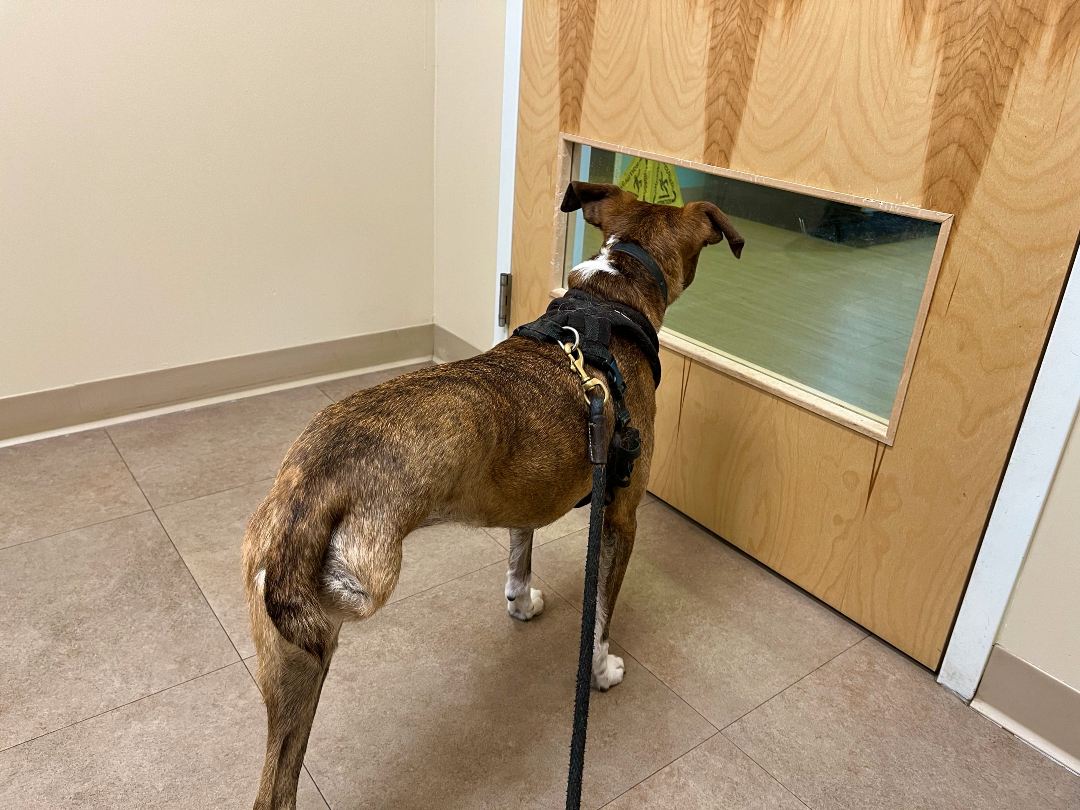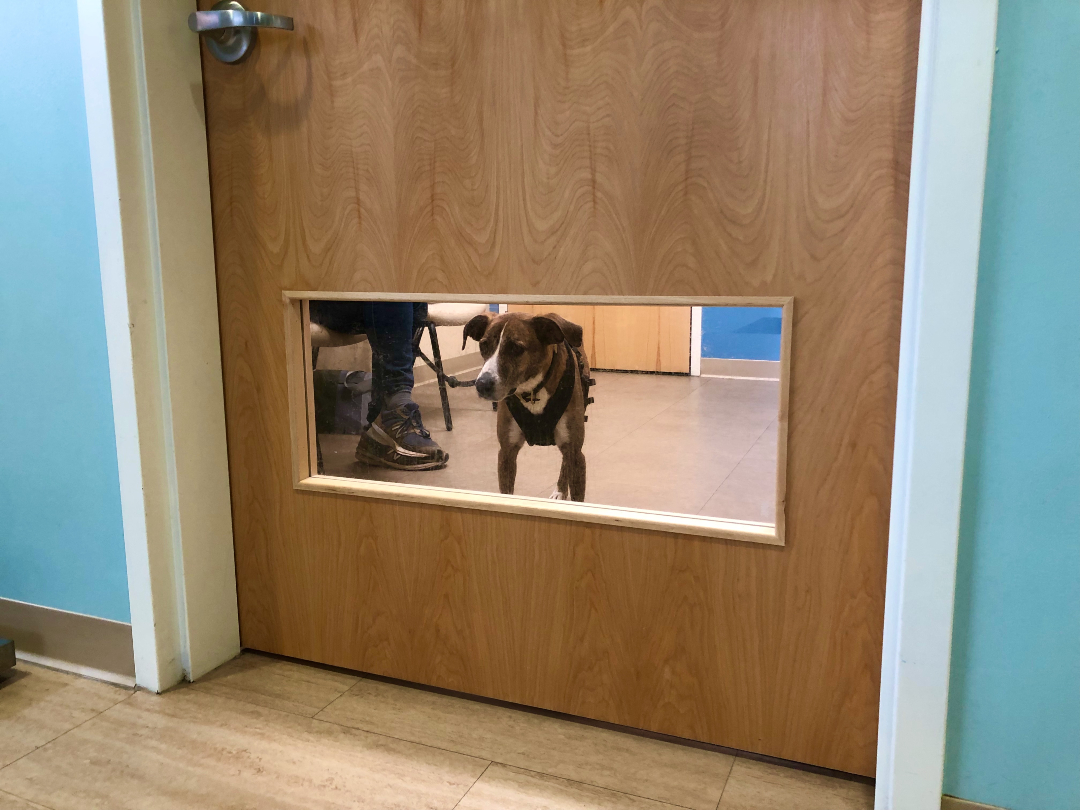The Yale Vaccine Cancer Treatment for Dogs is big news in the dog cancer world, and in the Tripawds Discussion Forums. The following article was generously contributed by Juno’s mom Natalie, to help us learn more about this very exciting therapy for dogs with osteosarcoma and other cancers.
September 26 was a big day for Juno (aka June) as she officially became a “Dog of Science.”
We’ve been calling her “Candidate Dog of Science” since she joined the waitlist for the Yale EGFR/HER2 cancer vaccine study. But on the 26th, after a battery of tests, she was accepted into the trial and received her first dose. Woot!

For Juno, the main interest that day was the doggo-level window in the exam room. Not a feature for everyone, to be sure, but for her it was like the bygone thrill of hotel cable when all you have at home is broadcast channels.
What are Immunotherapy Vaccines for Dog Cancer?
Dog Cancer immunotherapies like the Yale vaccine are a way of cueing the body’s natural defenses to prevent, halt, or even turn back some levels of metastases – even as significant as some lung nodules in osteosarcoma dogs.
The thing is, many of the available immunotherapies (including ELIAS, Torigen, and loosely speaking, FidoCure, which is a bit different) require a specially prepared tumor sample in order to produce the treatment for each individual dog and their particular cancer.
What Dogs Can Get Immunotherapy Cancer Treatment?
By the time I first learned about immunotherapies, Juno’s leg and its tumor were already gone since her amputation surgery had happened just a few days previous. I was heartbroken that it appeared we had lost our chance.
But then, one fellow Tripawds community member pointed out that the Yale vaccine study did not require a tumor sample (it did in earlier trials, but no longer).
The dog still had to fit the current guidelines and pass a battery of exams at the owner’s expense, but if accepted into the trial and willing/able to complete the required follow-up, the vaccine itself would be free.*
- As soon as the Yale EGFR/HER2 vaccine receives USDA approval, which the oncologist who administered it told us could happen at any time, it will be offered for a charge, but will also likely be offered more broadly beyond the current limited study sites! Any dogs already enrolled in the study would not be charged for any remaining booster doses if approval happens before they receive them.
What is the Yale Vaccine for Dogs with Osteosarcoma Cancer?
Curiously, despite a smattering of study sites that do administer the vaccine, one of the places you can’t get it is in New Haven, CT, the home of Yale itself! This is perhaps in part because Yale doesn’t have a veterinary school.
The study and the work behind it is actually out of the Yale Medical School. The researchers are primarily aimed at advances in human cancer treatment – which can benefit our dogs along the way!

The vaccine is a work of comparative oncology and translational medicine which works to use findings across different species and disciplines to further human medicine. In this case, it’s using trials in veterinary medicine to not only improve the cancer outcomes for dogs, but to also potentially lead to improvements in human cancer treatment.
How the Yale Vaccine Works
Specifically, for the Yale vaccine study (read the paper in Translational Oncology), there are certain human cancers (e.g. colorectal, breast) that have poor outcomes where the tumors have mutations that over-express one of two similar molecules called Epidermal Growth Factor Receptor (EGFR) or Human Epidermal Growth Factor Receptor 2 (HER2).
Dogs share the same or related over-expressions in common with humans for certain canine cancer tumors (EGFR in the case of osteosarcoma). The Yale vaccine targets that over-expression.
It’s possible that success in dogs with this vaccine could lead to advances in treating humans who, like dogs, experience certain cancers which are both aggressive and hard to treat.
But not all dogs’ and not all humans’ tumors have this over-expressive mutation (EGFR/HER2), and even among those that do, not all will respond in the same way to immunotherapies. This is why the Yale vaccine doesn’t always produce the same results in every dog.
- Part of the ongoing work in this area is to understand who benefits and who doesn’t, and why. Interestingly, in both dogs and humans the gut microbiome has been linked to immunotherapy response, and cancer susceptibility and treatment in general.
Are there Side Effects to this Dog Cancer Vaccine?
When we looked into the vaccine for Juno, what we learned was that its most common side effect is a sterile cyst at the injection site (typically about the size of a marble, the clinic told us) which is harmless and fades in 1-2 weeks.
Beyond that, the vaccine would likely have one of three results:
- It might not prolong the length and quality of her life beyond what might be expected from the standard of care she was already undergoing
- Or, it could further prolong the length and quality of her life — yay!
- And it could put the cancer into complete remission!
Some Preliminary Yale Vaccine Findings
Of the dogs with osteosarcoma in an earlier study of the vaccine:
- 65% who were given both the vaccine and standard of care (carboplatin chemo and amputation) were still alive after 12 months
- versus the 35-40% 12 month survival rate expected of dogs who are given only standard of care.
June Becomes a Dog of Science
And regardless of which of these scenarios unfolded, our June would become a “Dog of Science,” joining that long string of participants and researchers who have contributed to ongoing medical advances. Advances that friends and family (furry and otherwise) may benefit from today and on into the future. Even as we hoped for the best, it seemed like a win no matter what.
Learn more about the Yale EGFR/HER2 vaccine study and its current status here.
Natalie & Juno, D.O.S.
Our dog was diagnosed with suspected osteosarcoma after she suddenly developed a limp. After consultation with an oncologist we did not have a biopsy performed and proceeded with amputation followed by the biopsy for confirmation 2 weeks and 4 days after the suspected diagnosis. The biopsy did confirm osteosarcoma and we caught it early. X-rays do not show any signs of metastasis. We enrolled in the Mamula/Yale vaccine trial and our dog will receive her first dose tomorrow and the second three weeks later. We also decided to skip chemo for a few reasons (not financial). I would like to share our experience as we travel on this journey in case it helps anyone else in making decisions and best choices for their beloved animal friends
Hi Ann, we are sorry you had to join our club but thank you for commenting and offering to help others with your experience. Lots of people ask about the Yale vaccine so we appreciate it! The best way to do that is to join our Tripawds Support Circle. We hope to see you there in the Share Your Story space!
our dog just got diagnosed . any info on the cancer in the bone reversing or going away so as not to amputate
Victor, we are sorry about your dog. Please join us in the Tripawds Discussion Forums so we can help you better.
Hello everyone,
My boy Taz is waiting for approval to receive his vaccine. We have just started chemo today as well, and amputation was performed Nov 21. Curious if anyone is in the same boat, with their dog having the amputation, chemo (doxorubicin/carboplatin combo), and received the vaccine?
Thanks in advance & sending all my love to you & your fur babies
Layken & Tazzy
Welcome! You’ll find much more help and support from others with the same experience by posting in the discussion forums. Start by searching or reviewing these Search results for ‘vaccine’.
Hi,
Yes we are in the same boat. Our 15 month old golden is scheduled for amputation this Tuesday. Then we will do chemo and we have a consultation appointment for the vaccine. I believe this is the best battle plan for this type of cancer.
Where do you get the vax?
Follow the links in the post for complete details Francie. Try this one for starters.
Thank you, Suzanne, Our Golden Retriever had his Yale Vaccine in August and September. Theo is doing great, and we are very hopeful!
Do you know if there are any plans for boosters?
This is all I know about boosters. On Mari Maeda’s suggestion, I wrote to BARC in Edmunds WA and asked about boosters. Nick has an appointment on March 17th, for his “Eighth month” booster which in his case would be 8 months from the first booster, not from the original shot. It is probable that different clinics nationwide have different policies about offering boosters. Also it’s possible that individual clinics have policies about which dogs are accepted, I don’t know. In Nick’s case, he got his initial shots from BARC, he’s very active and healthy now, and he had a relatively large and short lived cyst at the vaccination location, all of which would seem to be in his (and Theo’s) favor. Anyway, probably a good idea to call your clinic now for your spring appointment, and then call around if it’s not available from them.. Good luck to you and Theo,
“Jerry”, I just saw Diane’s question. Is there any way I can PM Diane, or she can be notified? The Yale booster information above still applies for her.
Diane should see your note Suzanne. Unfortunately she didn’t register as a member, otherwise you could reach out to her via our Private Messaging system.
Nicholas received the Yale vaccine beginning on July 12 at BARC in Edmonds WA a bit less than a month after his amputation. He has had very little chemo for various reasons and only lately. So you might say that the vaccine has helped him or just that he’s a lucky boy. It’s too soon to speculate. Probably a little of both.
What i can say is that I chose the vaccine because the side effects were very likely to be safe (one day of discomfort as it turned out), and the interference with his great quality of life was minimal, just two shots and a blood draw after the initial oncologist intake and CT. The clinic doctor and staff were great, they let us consult outside on the porch so he wouldn’t have to sit around a waiting room and they were impressively honest and straightforward about the statistics, which I value. All my questions subsequently have been answered quickly in the same friendly and transparent way.
So we’ll see, but there are really no downsides for the dog here and that is my main goal for Nicholas, a wonderful life, every day..
Thanks for sharing here Suzanne! So glad that Nicholas is doing so well.
Hi Suzanne! Our 8 year old great Dane just got the first round of the Yale vaccine yesterday. He has no signs of metastasis at the time of the injection, but is really bothered by the tumor on his paw. We will still probably be getting his leg amputated after his second injection in three week. How is Nicholas doing since you last posted? Thanks so much!
Cameron, good luck and best wishes to you and your Dane. Let us know how we can help. Meanwhile you can see here that Nicholas is doing really well!
Juno, Natalie and Burr — excellent! Clinical trials are a great!